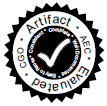 |
Artifact Evaluation for CGO'15 |
Prizes for 2 highest ranked artifacts
|
"Nvidia Quadro K6000" for |
"Acer C720P" for |
| Important dates
Packaging guidelines We use the following guidelines for artifacts. Because we want to encourage as many of you as possible to submit, these are only guidelines, not hard rules. Of course, if the material you want us to evaluate is fairly standard, following these suggestions will greatly simplify our lives. After all, remember: You want us to be able to evaluate your artifact, don't you? How to submit Please read the guidelines on what to submit. Please upload your submission to EasyChair (common with PPoPP). Review process The review process is described in detail here. |
Artifact Evaluation Committee (AEC) Chairs:
Advisory board:
Committee members:
|
Above threshold List of papers with artifacts above threshold:
Discussions We consider AE as a continuous learning curve. If you have questions or comments and suggestions on how to improve packaging and reviewing process, please get in touch or use our public Google or LinkedIn groups. We will hold a joint public CGO/PPoPP AE discussion session on February 9th, 2015. |
|
Prior Artifact Evaluation Artifacts have been already evaluated at several conferences and workshops including recent PLDI 2014, OOPSLA 2014 and ADAPT 2014. Our eventual goal is to develop common evaluation methodology gradually and collaboratively. See artifact-eval.org, cknowledge.org/reproducibility and mailing list for more details. | ||
Sponsors and supporters

